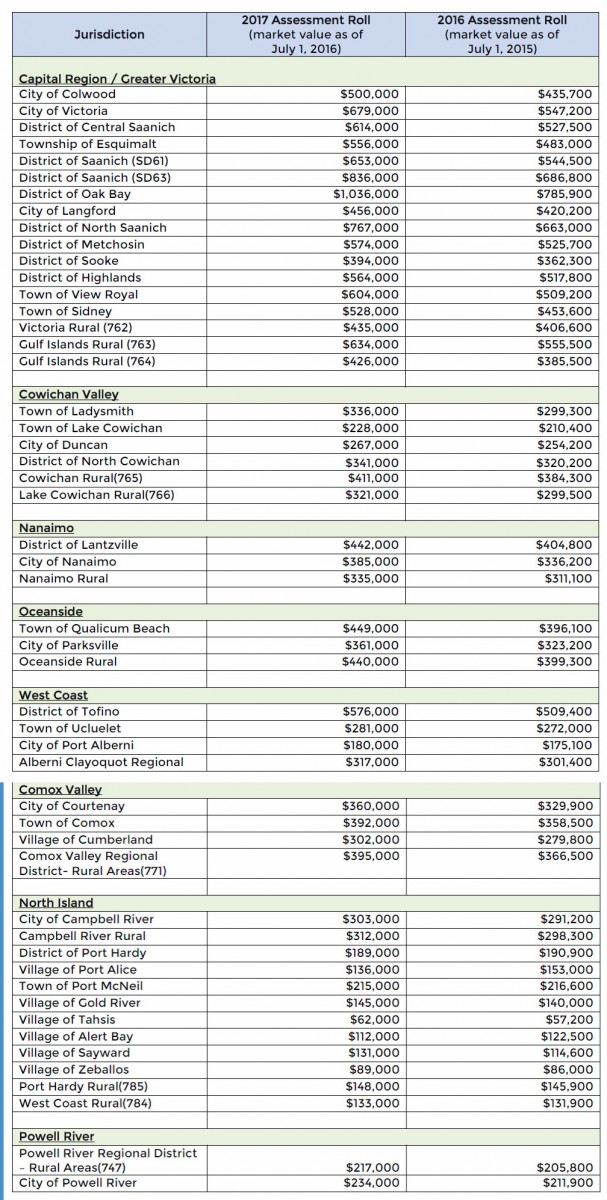New property assessment information is now available from BC Assessment, and most properties in Greater Victoria have increased in value. You can search property information on the BC Assessment website.
It is important to note that your property taxes won't necessarily increase just because your assessed value went up. An exception is if your assessed value has gone up by a much higher ratio than is average in your municipality. If your increase is less than average compared to your community, your taxes may go down despite an increase in property value.
BC Assessment reports that the average property assessment increase in Colwood for July 1, 2016 assessments is between 10-15%.
Property taxes are based largely on the City services that are provided, and are also impacted by regional services provided by School Districts, the Capital Regional District, BC Transit and others. Colwood 2017 budget process gets underway this month and residents are encouraged to get involved.
Learn more about property assessments in the BC Assessment News Release: Vancouver Island 2017 Property Assessment Notices in the Mail (linked here and copied below)
BC Assessment News Release: Vancouver Island 2017 Property Assessment Notices in the Mail
VICTORIA, BC —In the next few days, owners of more than 360,000 properties throughout the Vancouver Island region can expect to receive their 2017 assessment notices which reflect market value as of July 1, 2016.
“The majority of residential home assessments within the region are shifting between +5% to +25% compared to last year’s assessments,” says Regional Assessor Tina Ireland. “A robust real estate market over the past year resulted in assessment increases for many properties in the Vancouver Island region, most notably those in the Greater Victoria areas which have indicated increases up to 40%.”
As B.C.’s trusted provider of property assessment information, BC Assessment collects, monitors and analyzes property data throughout the year. The table below indicates the Vancouver Island region‘s estimated typical percentage changes to 2017 assessment values by property type compared to July, 2016 (note that property assessments may vary by individual jurisdiction/municipality within the region).
Overall, the Vancouver Island region’s total assessments increased from $170.15 billion in 2016 to $193.21 billion this year. A total of almost $2.91 billion of the region’s updated assessments is from new construction, subdivisions and rezoning of properties. The Vancouver Island assessment region includes all communities located within Greater Victoria, South Island, Central Island, North Island, West Coast, Northern and Southern Gulf Islands and Powell River.
The summary below provides estimates of typical 2017 versus 2016 assessed values of residential homes throughout the region. These examples demonstrate market trends for single family residential properties by geographic area:
BC Assessment’s website at bcassessment.ca includes more details about 2017 assessments, property information and trends such as lists of 2017’s top valued residential properties across the province. The website also provides self-service access to the free online e-valueBC service that allows anyone to search, check and compare 2017 property assessments anywhere in the province.
“Property owners can find a lot of information on our website including answers to many assessment-related questions, but those who feel that their property assessment does not reflect market value as of July 1, 2016 or see incorrect information on their notice, should contact BC Assessment as indicated on their notice as soon as possible in January,” says Ireland.
“It is important to understand that large increases in property assessments do not automatically translate into a corresponding increase in property taxes,” adds Ireland. “It all depends how your actual property assessment changes compared to the average change in your community. If a property owner is still concerned about their assessment after speaking to one of our appraisers, they may submit a Notice of Complaint (Appeal) by January 31st, for an independent review by a Property Assessment Review Panel.”
The Property Assessment Review Panels, independent of BC Assessment, are appointed annually by the Ministry of Community, Sport and Cultural Development, and typically meet between February 1 and March 15 to hear formal complaints.
The Vancouver Island region BC Assessment offices are located at:
Victoria Office
#102-3350 Douglas Street
Victoria, BC V8Z 7X9
Nanaimo Office
#300-125 Wallace Street
Nanaimo, BC V9R 5B2
Courtenay Office
2488 Idiens Way
Courtenay, BC V9N 9B5
During the month of January, office hours are 8:30 a.m. to 5:00 p.m., Monday to Friday. Property owners can contact BC Assessment toll-free at 1-866-valueBC (1-866-825-8322) or online at bcasssessment.ca
Follow BC Assessment on Twitter, YouTube, Facebook, and LinkedIn.
-30-
Media contacts:
Capital Region / Greater Victoria
Tina Ireland,
Assessor, BC Assessment
Tel. 1.866.825.8322 Ext. 01236 Email: tina.ireland@bcassessment.ca
Central & North Island, West Coast, Northern & Southern Gulf Islands, Powell River
Bill Dawson
Deputy Assessor, BC Assessment
Tel. 1.866.825.8322 Ext. 04251 Email: bill.dawson@bcassessment.ca
Christopher Whyte
Deputy Assessor, BC Assessment
Tel. 1.866.825.8322 Ext. 06242 Email: christopher.whyte@bcassessment.ca
MEDIA BACKGROUNDER
January 3, 2017
Facts on B.C. Property Assessments and the 2017 Assessment Roll
- Total number of properties on the 2017 roll is 2,017,364, an approximate 1% increase from 2016.
- Total value of real estate on the 2017 roll is $1,667,918,048,627 ($1.67 trillion), an increase of over 25% from 2016.
- Total amount of ‘non-market change’, including new construction, rezonings and subdivisions is approximately $25.2 billion, an increase of almost 24% from the 2016 roll of $20.4 billion.
- In B.C., approximately 88% of all properties are classified with some residential (Class 1) component. This equates to $ 1,298,409,769,982 of the value on the total provincial roll.
- Over 98% of property owners typically accept their property assessment without proceeding to a formal, independent review of their assessment.
- Assessments are the estimate of a property’s market value as of July 1, 2016 and physical condition as of October 31, 2016. This common valuation date ensures there is an equitable property assessment base for property taxation.
- Changes in property assessments reflect movement in the local real estate market and can vary greatly from property to property. When estimating a property’s market value, BC Assessment’s professional appraisers analyze current sales in the area, as well as considering other characteristics such as size, age, quality, condition, view and location.
- Real estate sales determine a property’s value which is reported annually by BC Assessment. Local governments and other taxing authorities are responsible for property taxation and, after determining their own budget needs this spring, will calculate property tax rates based on the assessment roll for their jurisdiction.
- BC Assessment’s assessment roll provides the foundation for local and provincial taxing authorities to raise over $7 billion in property taxes each year. This revenue funds the many community services provided by local governments around the province as well as the K-12 education system.
- BC Assessment’s website provides a listing of property assessments and sales to help property owners understand their property's market value and provide comparable sales information. Go to bcassessment.ca and click on the e-valueBC link. For more information on the 2017 Assessment Roll and regional and province-wide real estate market trends including lists of the province’s top valued residential properties, please visit www.bcassessment.ca and click on the “Property Information & Trends” link.


